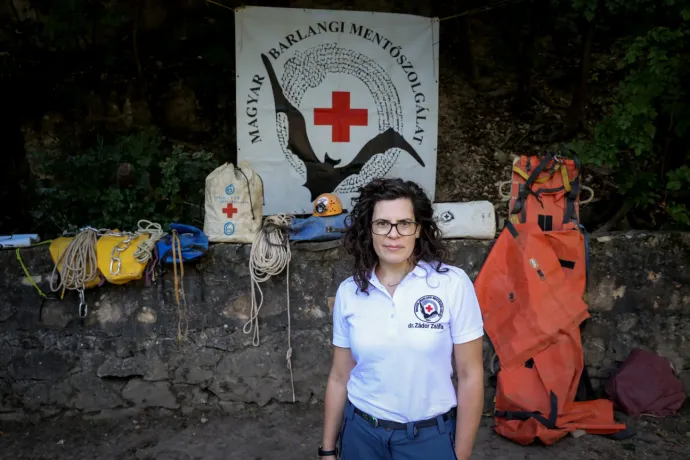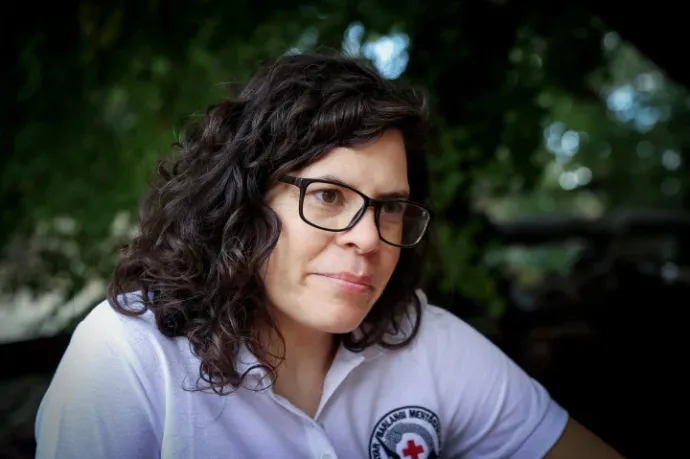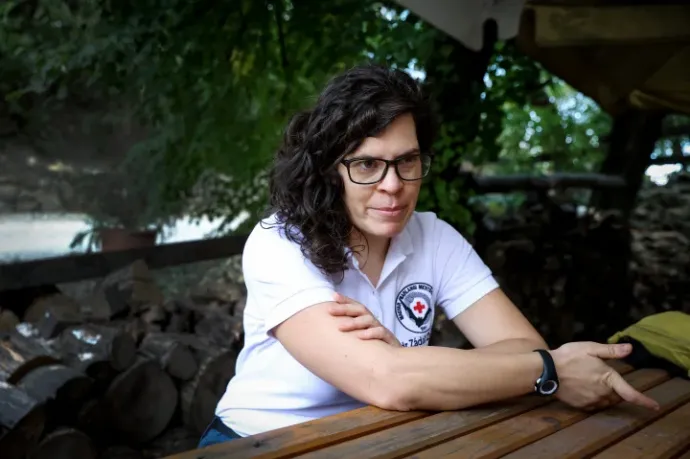I haven't been able to cry yet, but I'm sure it would feel good

- Hungarian doctor Zsófia Zádor was part of the international team that rescued American caver Mark Dickey from the 1040-metre deep Morca cave in Turkey.
- Mark Dickey suffered severe gastric hemorrhage in early September. His condition was life-threatening. Volunteers from the Hungarian Cave Rescue Service played an important part in the rescue operation, which involved nearly 200 people. Zsófia Zádor, who treated Dickey had a particularly important role.
- Following her return home, the anaesthesiologist and intensive therapy specialist of the Balassagyarmat hospital told Telex why she didn't for a moment hesitate about committing to the mission; what challenges her body was faced with during the seven days spent in the cave and what she likes about the dark and narrow cave passages in general.
You've only been back home a few hours. Have you been able to get some rest?
I haven't had a good night's sleep since 2 September. But I'm used to it by now, as I'm often on call two days in a row at the hospital, so I can cope with this kind of strain better. I was physically more tired when I was still in Turkey, now I feel more of a leaden fatigue.
There's a photo of you that has made rounds in the press. It was taken when you returned to the surface after seven days in the cave. You look a bit worn out, and you're clutching a canned drink. What kind of drink was it?
Beer. The second Hungarian team that came out had brought it and they had hidden it at the entrance so that we could drink it when we came out of the cave. But it was really only on the last day that we celebrated, nearly 200 people were hugging each other, we were very happy.
How do you explain the fact that the rescue of a single person has generated such strong emotions, not only among those involved in the rescue, but among millions of people around the world?
When I was a child, if I found that I wasn't enough to accomplish a task on my own and I needed the help of others, I would get so stressed about it that I cried. We experience intense emotions, we cry because when we feel helpless, a lot of tension is built up in us. Unfortunately, my job has dulled this kind of sensitivity in me, because I have witnessed quite a lot of bad outcomes. I haven't even managed to cry yet since I came up, although I'm sure it would feel good.
The operation has been described as one of the world's most complex cave rescues ever, and the other record is that this was the first time that such a serious, life-saving medical intervention had been carried out at such a depth. To put this in perspective, what was your most complex rescue task until now?
The only one where I was the only doctor involved was in the Theatre Room of the Mátyás-hegy cave, which is part of the Pál-völgy cave system (in Budapest -TN). We practice here quite a lot, and it is well equipped for rescue, as tourists can also take part in paid tours, so accidents happen occasionally. My most complicated rescue until now lasted forty minutes here. So there's a stark contrast.

As in similar cases before, there was huge media coverage of the rescue, with many people cheering for a successful rescue. Did the weight of it all reach you a thousand metres below the surface?
I tried not to think about it and worked to make sure all my feelings were in the right place. When I found out that there was such a buzz around us, I did wonder for a moment whether I really needed this. I wouldn't say I'm someone who longs to be famous. And now I can't avoid the world press. I did feel the responsibility of my job, but I'm used to that because of my work in the hospital. Even so, it will take a long time to emotionally process the past few weeks.
What were you doing when you received the phone call about going to Turkey to rescue Mark Dickey?
It was 7:30 in the morning, I had my backpack on and I was opening the door of my apartment to go to the hospital when Dénes (Dr. Dénes Nagy, the medical director of the Hungarian Cave Rescue Service) called to tell me what had happened. At that time, it was not absolutely certain that I would be the one going, because there are two of us doctors in Hungary who are able to descend to a depth of 1,000 metres. The other doctor, however, was expecting his wife to give birth any minute, so he couldn't make the trip. That's how I ended up going.
Did you contemplate, even for a moment, whether to take it on?
No, because I immediately knew that my specific knowledge would be needed for this rescue. A doctor who isn't used to these conditions and to attending to a patient while being constantly fatigued would not have been able to cope psychologically and physically. The only obstacle in my case would have been if I had not been released from the hospital, but fortunately my director, Dr Judit Tóth is also a cave rescuer, so she understood what this situation meant and they managed to arrange for my replacement. I felt responsible for my friend, and felt that this was my job.
You could say it was a sense of calling, or even divine inspiration. I do believe in God.
How well did you know Mark before? Is he really as positive a person as he seems from his statements and photos ?
We've been on several expeditions together and have kept in touch. The last time he was in Budapest, my team and I called him up to go out for dinner and he told us he was leaving for Turkey in two days – for this expedition. Mark really has a fantastic attitude and I'm pretty sure that's contributed to him surviving the last few weeks. But his expertise in cave rescues was also a factor, as he is one of the foremost American authorities of the field.
Dickey's internal bleeding was treated with high doses of drugs and he also received a blood transfusion. Under normal circumstances, are these routine interventions for you as an anesthesioligist and intensive care physician?
Of course. They are part of everyday life in intensive care therapy and emergency care. What made the procedures special in this case was the location. We were as isolated from the outside world as if we had been on a space station, although they are perhaps better prepared for such cases there. Minor accidents are more common in caves: a broken rope or a broken tool might injure someone, an ankle may get dislocated or a person may fall from a certain height. We are prepared for such situations with first aid equipment, but not as much for internal medicine. Especially as Mark had no medical history at all here, there was no previous indication that he might have an ulcer.
What actually presented the greatest difficulty in providing medical care at such a depth?
Being cut off from the world, the lack of communication. There was no proper communication system set up with the bivouac, so if I asked for certain equipment or medication, it took three days for the information to reach the surface. As I said before, it was like practicing medicine on the battlefield. I had to feed Mark orally, which is not too fortunate in these conditions.
I tried to minimize invasiveness as there was a significant risk of infection, so for the transfusion, I used the intravenous route that his fiancée Jessica had previously set up for him. Even so, signs of inflammation were already evident when I removed the cannula. I tried to keep things as clean as possible, but it wasn't easy.
You spent seven days in the cave, with four to five hours of sleep in the cold temperatures of 4-6 degrees Celsius. How does one mentally prepare for something like that?
If an unprepared person were to be put in a place like that, they would surely panic, or at least feel very uncomfortable.
But we cavers are kind of crazy – in the good sense of the word.
We can cope with, and perhaps even love, difficult situations. In return, we stick together and are incredibly in-tune with each other. So psychologically, we see the whole thing completely differently, we practically enjoy it. Of course we try to prepare ourselves mentally as well: for example, we go to Montenegro for a week or two each year and spend three or four days underground, in caves in similar conditions – except it's maybe a bit more spacious and less muddy there.
Did you ever hit rock bottom?
A few days into it, when they asked me if I wanted a replacement, I said I felt perfectly fine. I didn't feel mentally tired or have any problems. It was only when I was on my way out of the cave that I was struck by how tough that place really is. Things happened so fast on the way down, and then exhaustion put me in a state as if I'd been hypnotised, so I couldn't even remember getting down.
You started caving thirteen years ago. How did you get into it?
It started with a love of hiking since I was a child. Then I went on a few caving trips, but I only became actively involved when Dénes Nagy and I became classmates at university, and I gradually found myself attending trainings.
It's not easy for a layperson to understand what makes these dark and narrow passages so attractive. What do you like about them?
What attracted me to cave exploration is that it's a bit like the monkey bars, slides and playing in the mud we all used to do as kids. So it's kind of a playground experience, and I think it's important to retain some of that child-like attitude as an adult. The other thing that I liked about it is that the cave doesn't differentiate: young and old, male and female, tall and short...everybody goes through the same narrow passageway, and everybody follows the same rope. If someone isn't as strong, that can be compensated by technique.

So only two of the doctors in the Hungarian Cave Rescue Service were qualified for this task, and as far as I know, there aren't many such specialists in Europe as a whole. Of these, approximately how many are women?
There are probably far fewer female cave rescue doctors than males, although the Italian doctor who replaced me was also a woman. As far as I know, she needed help getting down and up, and I am told that she had to be carried through the meander water. It is rare in Europe for doctors to be active cavers; most of the time, doctors working for the emergency services are only able to get around in a cave with assistance. But some of us are able to get around on our own.
How much danger were the members of the rescue team in during the expedition?
There are always risks, and everyone assesses the level of risk for themselves. There were minor accidents this time too. For example, on the way down, a stone rolled onto the foot of a Hungarian explorer from Transylvania, and a Polish cave rescuer got his foot caught between two moving stones, the poor guy screamed until they were removed. There was also a case of hypothermia when a Croatian rescuer fell into the water, which is really life-threatening. I only hurt one of my shoulders, perhaps while moving my bags at the airport, but then it was really sore on my way down into the cave. I also got my period, which means lots of cramping for me, and although I was prepared for that, it was quite hard.
Were your family members worried about you?
I called my mum and my sister with the news first. I told them I was going to Turkey, a thousand metres underground, because a friend of mine was vomiting blood. The first thing they said was that they understood it was important, but I was important too, why was I sacrificing myself? By now they are proud of me.
I recently spoke with an ultra-runner, and we compared the heroism of firefighters and extreme athletes. Where would you place yourself along the spectrum of heroes?
It's easier to judge from the outside, but I certainly don't feel like a hero. I just did what I could do, beyond my strength, while pushing myself a little beyond my limits. A reporter asked me how much of a miracle this was, and I replied that it was not a miracle, but the coordinated, precise, calm work of a lot of people. It’s fantastic to watch people pulling the rope, not caring about themselves, just pulling it as long as they can, only to realise that they have been at it for thirty hours.
This success was possible because of many such rescuers who pushed themselves beyond their limits and made a huge effort.
Last week, a film by Hungarian director Gábor Reisz , made without any state funding, won an important prize at the Venice Film Festival, and now the Hungarian Cave Rescue Service, which also operates without state funding, as an NGO, has also brought glory to Hungary. The Minister of Foreign Affairs, for example, hasn't even publicly thanked you all for your work.
But Viktor Orbán did post a picture of us on Facebook saying he was proud of us. And the Ministry of Defence has congratulated us, while the Ministry of Foreign Affairs provided us with a grant within one day, and they are actually expecting us for a meeting on Monday.
But frankly I try not to pay too much attention to politics because I think it creates too much tension. It's nice to be acknowledged, but it's a bit untoward that the Cave Rescue Service had been harassed many times over the years and we had been explicitly suppressed. However, in the Kossuth Cave rescue last year, just like in Turkey this time, the TEK (Counter Terrorism Centre) was very actively involved in helping us. Unfortunately, tragically, we were only able to recover the body of our colleague last year, and that remains a painful trauma for me to this day, because Márton was a very good friend of mine.
We really are a non-governmental organisation, and our income comes mainly from the 1% of tax donations and the membership fees we pay, so it would be important if more people supported us. I also pay my membership fee regularly and I give my 1 per cent to the Hungarian Cave Rescue Service. This is how we are able to go on trainings and missions.
So would it be correct to say that to some extent, you funded this rescue operation for yourself?
To some extent I did, or at least I contributed to it a little bit financially.
We used the Alrite speech-to-text application as part of a paid collaboration for this interview.